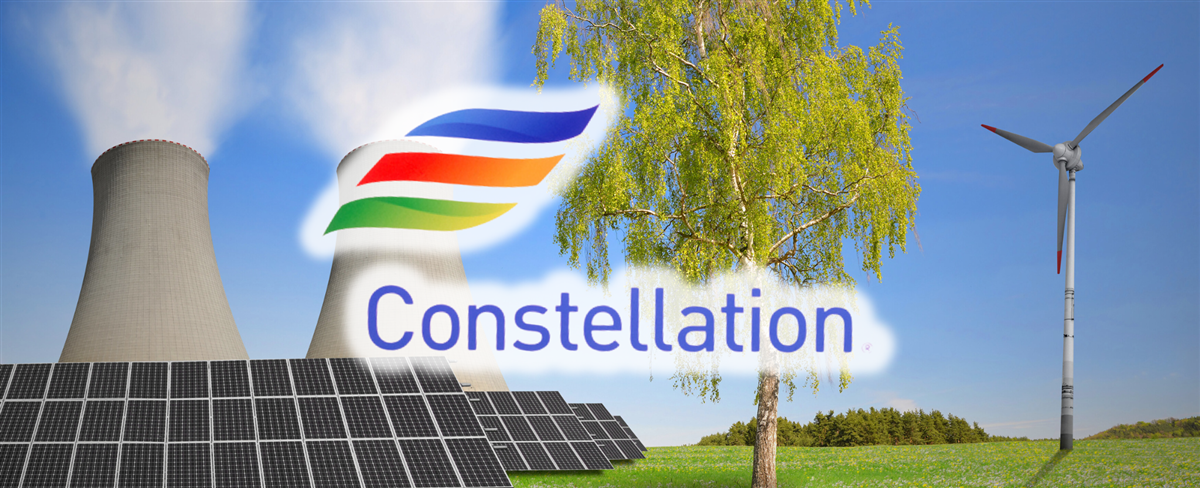
Constellation Energy (NASDAQ: CEG) stock is up over 8% on January 2, 2025, following news of landmark contracts with the U.S. government. This price increase underscores the company's growing prominence in the clean energy sector and signals a potential turning point for nuclear energy's role in a sustainable future. The contracts validate Constellation's strategic focus and position the company for continued growth in the expanding clean energy market.
Powering America: A Look at Constellation Energy
Constellation Energy is a major player in the U.S. energy market, with a diverse business model encompassing electricity generation from nuclear, renewable, and natural gas sources, along with retail energy sales, risk management, and energy efficiency services. The company champions "clean," or carbon-free, energy generation through its nuclear fleet, the largest in the United States, and through its growing portfolio of renewable resources.
Serving a diverse mix of government, commercial, industrial, and residential customers, Constellation boasts a market capitalization of $75.88 billion and a generating capacity of 33,094 megawatts.
A Billion-Dollar Boost: Constellation's Government Deal
The U.S. General Services Administration (GSA) has awarded Constellation Energy over $1 billion in combined contracts, a move that will substantially impact the company and the energy industry. The contracts include a 10-year, $840 million agreement to supply more than 1 million megawatt-hours (MWh) of electricity annually to over 13 federal agencies across five states and the District of Columbia beginning in 2025.
This power will be sourced from Constellation's existing nuclear and other carbon-free generation assets, supplemented by strategic investments to increase output through plant "uprates." Uprates refer to modifications and upgrades at existing nuclear facilities to boost their generating capacity. In this case, the uprates will enhance output by 135 megawatts. The GSA agreement fixes power supply prices over the 10-year period, ensuring predictable electricity costs for the federal agencies involved.
The agreement will service 80 federal facilities through the regional transmission operator PJM Interconnection. The second contract is a $172 million energy efficiency agreement to implement improvements at five GSA-owned facilities in the National Capital Region.
These improvements include weatherization, LED lighting upgrades, and the replacement of existing steam heating systems with electric boilers and heat pumps. This contract represents the largest energy purchase in GSA history, and signals increased government support for nuclear power as a reliable, carbon-free energy source. It marks a turning point for the nuclear energy industry, demonstrating its growing importance in meeting the demand for clean electricity.
Nuclear Renaissance: Impact of the Deal
These GSA contracts have profound implications for Constellation Energy. They underscore the company's leadership in the clean energy transition and reflect growing market recognition of nuclear power's importance. By securing a significant, long-term government contract, Constellation solidifies its position as a key player in providing reliable, carbon-free energy solutions.
This deal enhances Constellation's ability to extend the life of its nuclear plants, invest in necessary upgrades, and further optimize its operations. Constellation will generate and supply the energy, as well as manage the related transmission and distribution logistics. The contracts also open up opportunities for further growth in the government sector.
This mirrors Constellation's recent 20-year agreement with Microsoft (NASDAQ: MSFT), highlighting the rising demand for nuclear energy from government and corporate entities seeking carbon-free electricity. Constellation CEO Joe Dominguez emphasized the deal's significance, stating that it is “another powerful example of how things have changed.”
He noted that the contract, along with other recent deals, positions Constellation and its partners to add a significant amount of clean energy to the grid by 2028.
Constellation Energy Stock Analysis: A Bright Outlook?
Constellation Energy’s earnings report for the third quarter of fiscal year 2024 (Q3 FY2024) revealed earnings per share (EPS) of $2.74, exceeding analyst estimates. Revenue grew by 7.2% year-over-year to $6.55 billion, surpassing expectations.
Q4 2023 reported a GAAP net income of $0.10 EPS, and a revenue of $5.80 billion, signaling even greater increases in their quarterly earnings reports and revenue year over year. This performance, coupled with the GSA contract wins, propelled Constellation Energy’s stock price upward.
The company's trailing and forward price-to-earnings (P/E) ratios are 26.75 and 27.08, respectively, and its P/E growth ratio is 1.74, indicating strong growth potential. Analysts' consensus maintains a "Moderate Buy" rating, with an average price target of $281.43, ranging from $235.00 to $342.00.
The company offers an annual dividend of $1.41 per share, representing a 0.58% dividend yield and a 15.55% payout ratio, signifying financial stability and sustainability despite the modest yield.
Constellation Energy: Illuminating the Future of Clean Energy
Constellation Energy’s stated strategic objective to achieve 100% carbon-free generation by 2040 is ambitious. The GSA contracts, combined with investments in new technologies like those for building renovations at GSA facilities, are stepping stones toward that goal.
Their future success depends on continued support for existing nuclear plants, regulatory approvals for plant life extensions and upgrades, successful uprates, and further renewable energy development.
While Constellation appears poised for growth, investors should consider potential risks, including competitive pressures in the energy market, the uncertainty over the future of different clean energy government subsidies such as the PTC, and the possibility of regulatory hurdles that could impact the timeline of achieving its carbon-free goals.
The ongoing competitive terrain and the evolving regulatory environment for clean energy could also influence growth prospects.






